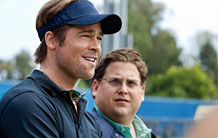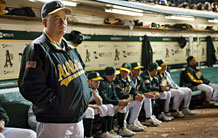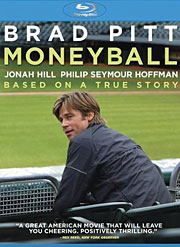- Rated PG-13
- Drama
- 2011
- Buy the BD
All photos © Columbia Pictures
Reviewed by David Medsker
()
ichael Lewis surely had no idea what was about to happen when he followed Oakland A’s general manager Billy Beane during the 2002 season for the purposes of writing a novel. At best, he was probably hoping for some insight into the mind of the first former big league player to ever become a GM, and what kind of mindset it takes to make the jump from dugout to corner office. What he uncovered, quite literally, changed the game; the resulting book, “Moneyball: The Art of Winning an Unfair Game,” espoused the virtues of sabermetrics, a numbers-driven philosophy that found value in unlikely places, and soon after its release, ball clubs big and small jumped on the Moneyball bandwagon. It’s a great story, but there was nothing about Lewis’ book that screamed ‘big screen blockbuster.’ Enter superstar screenwriters Steven Zaillian and Aaron Sorkin, who create a narrative that hits all the right notes, but takes the road less traveled to get there. The experience is a rewarding one, but it is rarely what one expects from a sports movie.
After blowing a 2-0 lead in the 2001 American League Division Series to the New York Yankees, Billy Beane (Brad Pitt), the general manager of the Oakland A’s (whose payroll was a third as much as the Yankees’ payroll), heads into the offseason looking to replace his two best hitters and his best pitcher, whom he is about to lose to free agency. Desperate to find a way to replace their production while staying within Oakland’s small-market payroll constraints, Billy pays a visit to Cleveland GM Mark Shapiro. The two don’t work out a trade, but Billy is fascinated with the stats-driven analysis that Shapiro’s assistant Peter Brand (Jonah Hill) shares with him. Billy makes Peter his new assistant, and the two put Peter’s sabermetric approach to the test, focusing on players who specialize in getting on base and anyone who is undervalued because of his uniqueness. The scouts rebel, insulted that Billy would choose the number-crunching “Google Boy” over their decades of experience, and the team’s manager Art Howe (Philip Seymour Hoffman) flat-out refuses to play Billy’s “boys” until Billy, quite literally, gives him no other choice. For the first two months of the season, the A’s are terrible. And then, it clicks.

“Moneyball” has all of the key components of your typical underdog sports movie, but it has a different rhythm. The score doesn’t sweep and soar, but rather takes the minimalist approach of Trent Reznor and Atticus Ross’ work in “The Social Network.” The family B-story isn’t about Billy forsaking his family, but rather about him working on his relationship with his tween daughter, who lives with Billy’s ex-wife. Several key moments in the film are silent, a technique that ultimately wrings an incredible amount of suspense out of a game that doesn’t really matter in the end. Zaillian and Sorkin’s script is at times hilarious, but the dialogue is (wisely) downplayed, with no hoary catch phrases or Sorkin’s trademark verbal volleying. Some might call it a thinking man’s sports movie, but that’s both untrue and condescending. It’s just…different.
Pitt’s performance here is sure to be overlooked, and that would be a shame. Pitt uses every resource available to him, from body language to inflection, to convey the complete lack of subtlety in Beane’s nature. It’s jarring at times, but that’s the point; Beane is not one to use sweet talk to get his way, and nothing demonstrates that better than the scene where Billy pulls off an impossible trade at the deadline, where he not only gets his man but gets another GM to stock his soda machine for three years. (You read that right.) Another aspect of the movie that will probably be overlooked but shouldn’t – and not in a good way – is the marginalization of Oakland’s Big Three starting pitchers Tim Hudson, Mark Mulder and Barry Zito, the latter of whom won the 2002 Cy Young Award. They were not examples of the Moneyball formula, and therefore the movie only shows one of them for a few seconds, but the three won 57 games among them, thereby making a massive contribution to the team’s overall success. The script also tries a bit too hard to shoehorn in references to the players that received a lot of face time in the book (namely Kevin Youkilis and Jeremy Brown) but were never significant to the A’s history. These omissions and additions are to be expected, but they’re dishonest.
For all of the melodrama that took place during production – Bennett Miller was the third man in the director’s chair, the movie was shut down for over a year, Jonah Hill replaced Demitri Martin, and Sorkin and Zaillian didn’t exactly work on the script together – the end result is a film worthy of Billy Beane’s unconventional rise to prominence. “Moneyball” acknowledges the unwritten rules of underdog movies, but is by no means a slave to them. It does what is expected of it, but on its own terms. That’s as close to a win-win as baseball will allow, which is awfully impressive given the circumstances.
Single-Disc Blu-ray Review:
The Blu-ray for "Moneyball" will thrill fans of both movies and baseball, as the deleted scenes include great bits that should have made the film, and the featurettes delve into the casting and the task of converting a difficult book into a nail-biter of a movie. Pound for pound, the Blu-ray for "Moneyball" is as loaded as they come.
 |
 |
 |
 |
 |
 |
You can follow us on Twitter and Facebook for content updates. Also, sign up for our email list for weekly updates and check us out on Google+ as well.













